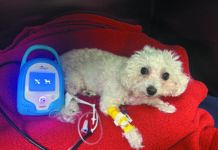[From Tufts May 2010 Issue]
Gallbladder disease is much more common in people than in dogs. The reason: “Humans have a very high incidence of gallstones, whereas dogs do not,” says Mary Labato, DVM, a specialist in internal medicine at Cummings School of Veterinary Medicine at Tufts University.
However, a wide variety of diseases other than gallstones can affect dogs. In addition to gallbladder mucoceles, these include:
– Pancreatitis, inflammation of the pancreas
– Hepatitis, inflammation of the liver
– Tumors of the bile duct or intestine, which can obstruct flow from the bile duct system by blocking or compressing the ducts — the tubes that carry bile to and from the gallbladder.
Other types of gallbladder disease less commonly seen in dogs are cholecystitis, an inflammation of the gallbladder and biliary tract (the path taken by bile as it moves from the liver to the small intestine), and gallstones. Veterinarians diagnose the conditions primarily through laboratory tests and ultrasound.
Tests may include a complete blood count, a chemistry profile, and if pancreatitis is suspected, a pancreatic lipase immunoreactivity test. Levels of lipase, one of the pancreatic digestive enzymes, increase dramatically in pancreatitis, permitting the diagnosis to be confirmed.
An ultrasound exam can be the definitive test, especially with gallbladder mucoceles, tumors and gallstones.
“Abdominal ultrasound helps us look at the liver, biliary tract and the gallbladder. We are able to see if there is an obstructive pattern going on,” Dr. Labato says. “Also using ultrasound, the gallbladder can be aspirated to obtain a sample of bile for cytology (microscopic examination of cells) and culture, which may help us identify the underlying disease.”
Once the problem is diagnosed, treatment ranges from medication to surgery. Cholecystitis usually responds to antibiotics or a combination of antibiotics and steroids. A stone obstructing the common bile duct can cause acute abdominal pain and may require surgical removal.




